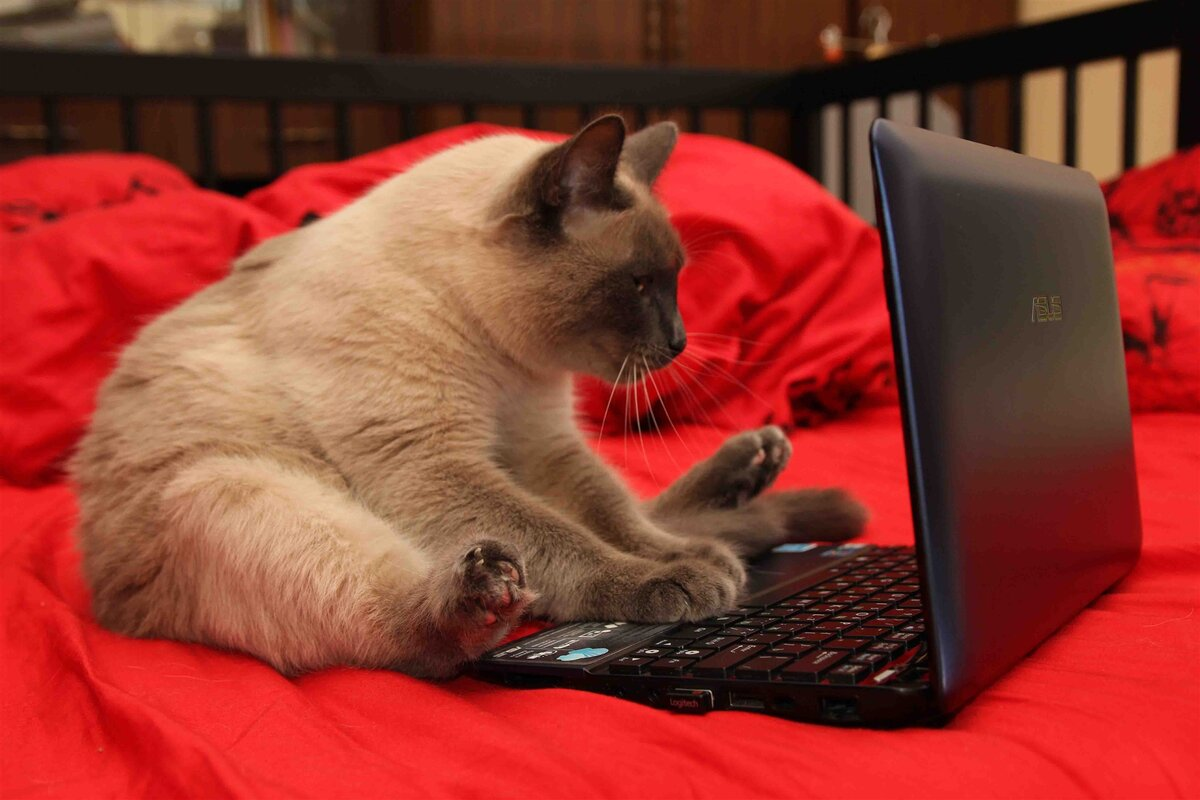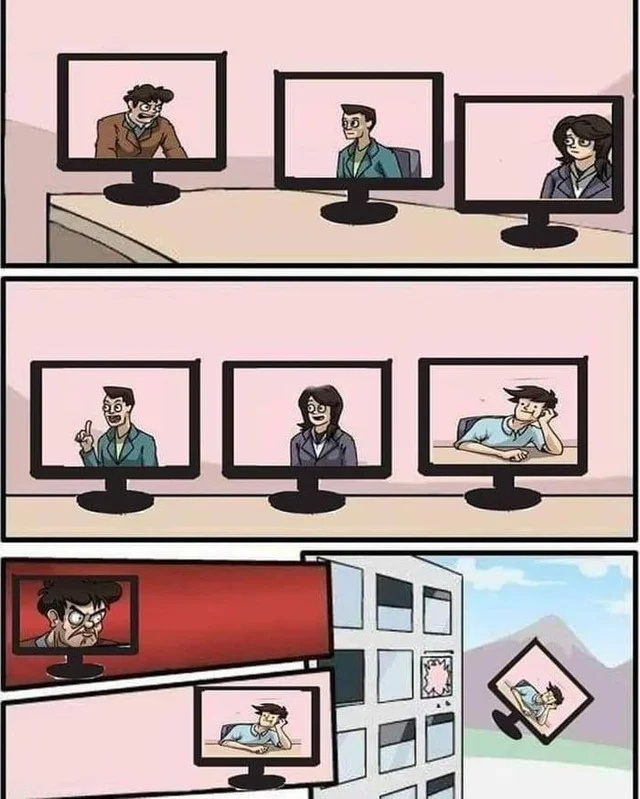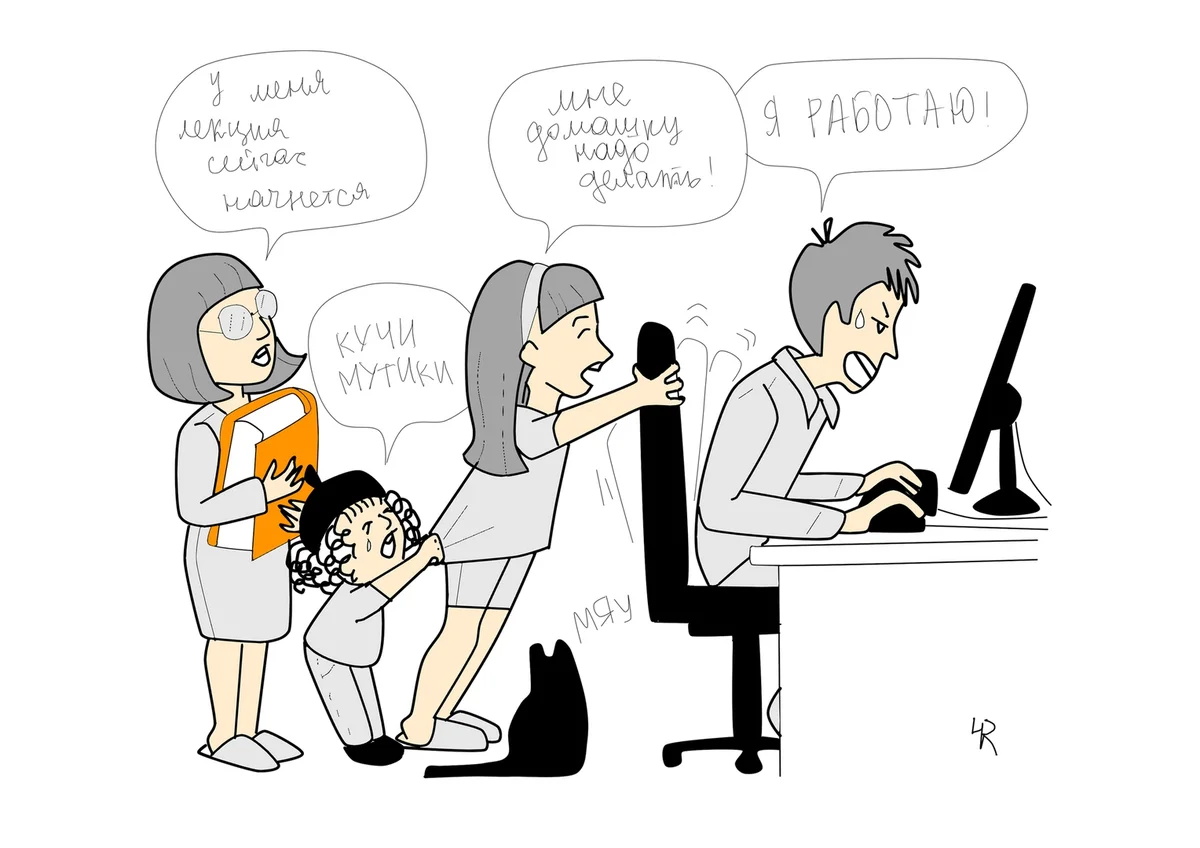
Chubby, dull, alone with a computer - this is how the distance goes
Disclaimer. The article was written by an employee of RegionSoft Developer Studio under the heading "Free microphone" and did not go through any approvals. The position of the author may or may not be the same as the position of the company. But, to the point, the remote format is familiar to us: over the years of work, we have carried out thousands of remote CRM implementations, including training and revision, our RegionSoft CRM is suitable for distributed teams, and in the team, as you already understood, we have remote employees ...Today we will talk specifically about the moral aspect of remoteness, about this complex component of it, which has not yet allowed and is unlikely to allow in the near future to build an adequate system of home-office work.
First and foremost is the relationship with work
Whole teams and companies are now remotely located, so many remote errors are still invisible - they will become noticeable for those who decide to continue using this format for themselves. Working remotely is definitely difficult, because whoever you are, whether you are a programmer, even a tester, or even a manager, your communications will be complicated. Yes, at first you literally get high: colleagues are far away, you may not be able to answer in instant messengers right away, and after thinking over your message, the boss is also somewhere out there and will not call you hard right now. It seems that it is calmer this way, the work flows in a measured way. The first bells seem like misunderstandings, but soon a whole complex of problems arises, with which you need to learn to live.
You blame yourself for the gaps in your work.If imperfections and overdue tasks in the office seem like an empty problem - just move the task in the calendar and notify all related colleagues, including the manager, then everything seems to be a tragedy at remote work. On the one hand, you are afraid that everyone will decide that you were messing around instead of performing your direct tasks, on the other hand, you are worried that you really did not cope, which means that something is happening with a professional resource, somewhere you gave up. At the same time, the reasons can be quite objective: a disconnection of the Internet or electricity, an overload by a parallel task, or a failure to complete the task by a co-executor.
This guilt absorbs you and your thoughts, which makes the work even worse: you begin to fear mistakes, strive to avoid them. And the one who, as you know, does nothing, is not mistaken. Indeed, the feeling of guilt for something easily turns a person into a cautious performer, and then into a procrastinator.
The period of complete "hammering" into work will come for everyone.The question is how long it will last and how noticeable it will be. I am a hellish, inveterate workaholic who works at work, on vacation, in transport, on the train - if there is no way to pick work, I think about it. But when switching to remote work, the state of "bolt put to work" came twice, and it was unpleasant. First, you allow yourself to spin a movie in the background, then you no longer listen to the background, but launch the content on the second monitor, then you are distracted by household chores or go to a store / cafe / for a run (only 15 minutes! Which soon becomes two hours 15 minutes), and then you realize that you have a full task manager of overdue tasks hanging and soon not only you will notice it.
At this moment, an unpleasant sensation comes: you need to find the strength and will to sit in the night, for a day or two non-stop and close all these debts, but the cunning brain loves to be lazy and is no longer ready to gather so quickly into a handful and help the owner to close work debts. By the way, I'm not joking about the brain - it's the most psychophysiology. Roughly speaking, without the usual rhythm of work on tasks, you quickly get dumb and look for other ways out of the situation.
In no case should you give up, confess, quit, etc. The way out: set aside panic and start methodically and carefully closing tasks, starting with the most unpleasant one - its solution will inspire you (while closing a simple and favorite work task creates a false sense of omnipotence and speed, and as a result, you will run into the worst tasks with deep disappointment) ... As a rule, in our IT-sphere, 3-4-day "breaks" in work are closed in a day of intensive work. But such marches are dangerous for health and nervous system, so try not to delay with a period of "doing nothing".

It is difficult for you to communicate with your colleagues.You begin to feel this after about a year. People who work in the same room, eat together, socialize, experience the boss's gaps and moments of company triumph, empathize with each other, represent a separate socio-cultural group. You've probably noticed that when you come to someone else's office or, for example, to someone else's university, you perceive the team as something very alien and sometimes even ugly (or your own business!). It's worse when it happens to your colleagues: they are a formed community, and you are a loner outside the brackets. Most companies diligently and ethically integrate remote users into their culture (chats, funny chat rooms for chatting, meetings and gatherings, video calls with cats and dogs, gifts, support), but this often looks rather unnatural. It's much more honest to admit that remote workers are a different subculture in the company.and each is their own, but their work and their loyalty are value for the company, their work is extremely important, and their contribution is appreciated. It helps both parties a lot.

So, you need to speak the same language and the same value system with a close-knit team. It turns out pretty bad, even if you are a joker, a chatterbox and you have a generally good character. It is difficult to convey emotions in chats and on calls, it is difficult to talk about an idea in the heat of the phone and discuss something with enthusiasm, scribbling on a sheet of paper. You are forced to speak clearly and measuredly, as always on the phone, you write to the chat, but you do not betray irony, sarcasm, surprise, admiration and even anger. The text of your message is saturated with emotions by the one who reads it - your emotion is born and interpreted in the head of the interlocutor, and there is a high risk of being misunderstood and offending someone.
This situation is depressing and you start to avoid general calls and meetings with your online presence. They get out of the habit of you and you fall out of your seemingly social clip even further. One thing beats in my head: “Where am I going? I'm not there." This position also affects professional tasks - you solve them outside the context of common interests, outside the pulse of the business in which you work. Work tasks become like Olympiad tasks: you need to urgently and coolly solve in order to win. The stage of functional execution comes.
Dealing with this situation is quite difficult. The advice is simple: do not drop out of informal communication, sometimes, if possible, visit your colleagues offline and find 1-2 people at work with whom you will have chemistry and magic, who will understand your intonation in chats and who will be your “connector” with the interests of the company and its employees. It is not easy, but not impossible. Nice bonus: such people can become your good friends for years to come.
You want to go to the office and at the same time do not want to leave the office.From time to time, there comes a desire to return to the office, move to another city or country (if the company is there) and work with everyone, enjoy office life, catch its pros and hate the minuses. But everything is already so well arranged: if necessary, sleep almost until the working day, calmly listen to your favorite tracks, use your free time for personal affairs, not get stuck in traffic jams and leave work in 1 second. On the other hand, you no longer understand whether this is your office or your home?
It's up to you to decide: for each, his own arguments in favor of a home or office outweigh. If the situation is hopeless and the remoteness is forced, just equip a mini-office at home and visually separate the workplace and places of home comfort. It helps a lot. For example, my mini-office is an old multi-tiered computer desk, which looks businesslike and serious, and an office chair also helps. This is a real micro-cabinet, which contains only work items and books.
You need to control yourself and work on discipline.An adequate employer will not supply you with a moronic work time tracker or a screenshots of the state of the screen, because he knows what trust and loyalty are worth. This means that you need to become your toughest boss: learn to plan, switch between tasks, not be distracted by social networks and entertainment, organize your workplace, food, etc. You are your own system administrator, colleague and assistant. It's difficult even if you are a super motivated employee. It is important to learn a few rules of home office discipline:
- working hours - for work
- strictly regulate breaks
- do not eat at the desk (try)
- if there is not enough willpower, programmatically block access to extraneous content.
These four points are enough to start organizing your remote work day correctly.

You are not growing up the career ladder. It's hard, it's sad, it's true. You will easily be overtaken by a weaker office colleague, because he is closer and he can present himself in a convenient personal format. No wonder: long-distance career growth is almost impossible. You can count on horizontal relocations or a slight change in your job title, but you are unlikely to succeed in becoming a project manager, product manager or team lead. Simply because in these areas of activity communications decide. Answer yourself to the question: do you need it?
By the way, on the other hand, at a new job after working remotely, you can immediately step over a few steps - in the event that you spend the time free from roads, smoke breaks and gossip coffee on training or developing a side project. Remote work is an ideal factor for becoming much cooler and extra pumping.
At some point you hear from an inexperienced colleague about yourself "and this is our freelancer Vasya" and your last nut of tolerance and adequacy breaks down.And this will happen too. Alas, for new employees (especially young ones) that the remote worker, that the freelancer - one story about "I sit at home, labeled code, cats, TV shows, food." And it is very offensive to hear such words or a question: “What are you doing there? Isn't it free? " Don't get fooled by these attacks, but don't let such an opinion form. Just reasonably and calmly explain that you are no different from your colleague, and in some ways even superior. In general, I advise: if you are quite far from the office and cannot quickly reach it, do not get involved in conflicts - you will lose in advance and will be known as a toxic asshole. This is very bad, since a remote conflict requires incredible resources to completely resolve it. It is often cheaper and calmer to remain silent, laugh it off or mention a question at a general meeting / video call and give a succinct and polite answer to it.(“They asked me what I was doing, and so, I just sort out bugs like this one - and now I see what is needed ... / further on the working part /” ).
You feel like you're being underestimated.Calm down - at a remote work, it will always be, if only because you, too, invent emotions and facial expressions of your interlocutors on the phone and chat. Do you have a salary, bonus, KPI, some bonuses and a full task manager for closed tasks? There is! So you are cool, this company needs you. Remember your office life, and if you don’t remember, believe me, I remember: they don’t hang gold medals around their necks and rarely thank them personally. The quality of work is evidenced by the fact of working in a company and receiving all material benefits. So take it easy - most likely, if you are thinking about this problem, you are a really cool employee and well done. You should know your worth.
You are afraid of evaluating your work and you yourself evaluate your work and your development within the profession very badly. This side effect arises from the fact that you have no one to compare yourself with: you do not have a complete picture of the work of other employees. Yes, you can compare lines of code or the number of open advertising campaigns - but you and I know that these metrics do not mean anything. You are nervous, it seems to you that you are worse than the rest - a little at a distance, so also “only” 14 hours worked. Calm down: if you work with concentration and quality, most likely you are no worse, even more productive and more efficient than others, since you are not distracted by the office hustle and bustle.
If you feel that you have "slipped" in the professional part, take some time for self-study, reading books, manuals, professional blogs, etc. Moreover, sometimes it is even useful to learn or read something basic on top of practice, such a maneuver is great for putting your skills and knowledge on the shelves.
Well, and one more little note: if you work poorly, they will tell you about it, now it is not customary to keep people out of pity or for beautiful eyes.
You are chronically overworkingand processing takes on two main forms: either you do your business for half the day and catch up with the working day in the evenings (this is bad), or you work stupidly 8 hours + 4-6 hours, because a) there is nothing else to do; b) work captivates; c) I want to do better and deeper, you go into perfectionism. In this situation, life is divided into two parts: work and sleep. I will not consider the first form, everything is clear with it: work should be done during working hours, but the second point needs to be dealt with.
As a rule, people who are not burdened with any family responsibilities (not necessarily without a family!) Or are accustomed to giving their relatives only one day off (because the second is also needed by work) work so much. And the main problem is that if something changes in your life, you will work less and turn your attention to a new event in your personal life. Formally, this is wonderful and joyful, but in reality it will seem to your employer that you have become worse and less work, because he is already used to good things, for example, to the fact that by the morning the most difficult task has been solved. You will immediately feel the change in the attitude towards you in the company and you will either have to go back into the turn of workaholism, or learn to set personal boundaries and become bad.
In addition, overwork is dangerous to health: after all, you do not go outside, do not play sports, you sit at the computer for 14-16 hours, obviously forgetting about breaks, landing rules, eye distance from the screen, etc., and so on. As a result: decreased muscle tone, changes in body fat, edema, problems with veins and many other minor troubles (which easily turn into large ones).
Finally, overworking will sooner or later affect the quality of work: you just get tired of thinking so much and being tense. A period of intellectual decline will come, which under a certain set of circumstances (there are no other interests, hobbies, habits, etc.) can become the first step of depression, and this is already a serious pathological condition, from which it is difficult to get out on your own (if someone else does not know , depression is not just a bad mood).
As a result of a combination of certain "syndromes" of remote work, you start to gradually burn out: interest in work disappears, the desire to solve problems outside the box, come up with something new, and actively participate in the life of the company. It hinders you, it affects your work and, as a result, hinders your employer.
It would be possible to arrange these theses in the order of their appearance in the life of a remote employee, but no - they do not appear one after the other, they replace each other chaotically and are often repeated. It is very difficult to go through everything and not come to burnout and mental exhaustion. The remote worker stays with himself and he is both a colleague and the strictest boss for himself - the rest depends on the degree of conscience and ... love of work. If you love the business you are doing, all these phenomena are much easier and especially do not interfere with life. But if the work is not so interesting, and remote work is chosen more as a format for exodus from a bored team, I have bad news: outside the office, outside of communication, outside of physical connection with the company, you will literally come to a decision to quit by leaps and bounds (although sometimes it is even better).
Relationship with yourself
Health is in your hands and that's a problem. Remote work can be a huge opportunity for health and appearance, and it can become the most negative factor in the systematic deterioration of the body's condition. There are two main ways.
- Alas, unpopular. Choose a meal plan, use breaks for small rounds of physical exercise in several sets, devote some of your free time to running, gym, pool, sports (when available). And to be honest, home workouts work wonders when you use them on an ongoing basis. It is not at all necessary to buy exercise equipment and pile up an expensive mini-gym, a rug and your own weight are enough for effective training.
- , . Eat — code — repeat. , , . , ( , ). , ( ), , , , , ( + , ) .
You need to be very conscientious and responsible to yourself in order to stay on the first path and not drive into the second and not slip in a comfortable rut. Getting out of the second path is very, very difficult (especially if you are 30+ and already have some problems), so the most valuable advice in this case is simply not to start. Fast dopamine converts food into a drug too quickly.
If you are already firmly involved in health and body problems, start going out right now - with a minimum, with small restrictions, with the first set of exercises. Just don't step back and don't look back. Leave only one food ordering service on your mobile phone, install an app with workouts, buy a fitness tracker and a blood glucose meter (this one especially can scare and motivate). It will be bad, sad and slow, but in a month the trend of cheerfulness and pleasure will creep up, and you will smile at the mirror. Remember: appearance and health is another job for you.
Loneliness wants to meet.You can be alone and not alone, but you can be in the center of events and remain alone. However, being in relative social isolation (being at a remote work), a person is more at risk of being alone. And it, in turn, is harmful to intellectual activity: depression, anxiety, self-doubt, constant anxiety, stress and depression arise. There is a real possibility of physical ailments. Being alone with your thoughts and events in life is difficult.
The way out of loneliness is your big work, which is not connected with the social circle. You must be in the clip, in your life, in your work. Tune in to the fact that you are not alone, but simply chose a convenient format of work and bring benefit. Chat, comment, go to conferences and meetups, read different books - and you yourself will not notice how you forget about your worst thoughts when you are alone. This is especially simple in IT: despite the closed nature of the sphere itself, inside it literally every city is full of meetings, events, online, etc. Just don't dismiss it. In addition, inside such events you can make good acquaintances, find interesting side projects (or work), become a speaker, mentor, etc.
You stop feeling like a business person, a business person, communication skills are lost- and almost better than the skills of a foreign language. This is really a very big problem that the remote programmer will surely face. If inside the company you are ready to become a manager, take on the work of a colleague who has gone on vacation or take free bread, participate in the discussion of the company's strategy from the standpoint of an expert or an amateur, at a distance you actually limit yourself to your work and become a cool (well, or not very cool) performer ... And this affects your personal traits: there is self-doubt, fear of the new, misunderstanding of the general strategy and your place in it, fear for work, etc.
You get nervous. Outside of social communication, with a very narrow circle of contacts, mood changes greatly, sharp changes appear, you forget about restraint and tact, because you do not use them in constant communication. In no case should you let yourself relax and change your communication style, let the mood rule you. Don't forget that you are communicating with colleagues, clients, etc. - that is, in a business environment. By the way, changing home clothes to more strict, business ones helps to return to the state of "gentleman".
But clothes are little things. The main thing is not to lose the pulse of the company, even if it becomes more difficult for you. Read about your competitors, the market in which you operate, learn new things in your activities - and then you will be on the crest of the wave. But, I confess, it's much more difficult to do this remotely than in the office. However, someone is satisfied with being just a cool performer "from now to now." And this, by the way, saves a lot of nerves, health and mental strength.
In general, if you feel that your battery is inexorably running out, get on the charge: books, learning, communication, sports. By the way, morning exercise itself is an excellent source of dopamine and a good habit, no joke.
Relationships with friends
"Come on in a chat, ok?" - this is how a remote employee increasingly reacts to an offer to chat on the phone or take a walk. And the point is not that a person has run wild and avoids communication (and this too), it is a matter of misunderstanding and difference of interests. It is difficult for friends who work in an office to understand a person at a distance: when they meet, they throw a little envy on your head mixed with all sorts of myths about being remote (“wow, freebie,” “well, you just forget to work,” “wow, all your now you have time "," class, you devote more time to Masha "," go nuts, you can play *** without end "). This does not cause anything but anger and hostility, and proving your honesty, decency and workload with foam at the mouth is not the best pastime at a friendly get-together.
And I'll tell you frankly: after self-isolation, things got worse. Friends and acquaintances, according to the news of their state, forgot to work (and it became less), did their own thing, carried out repairs, created culinary masterpieces and now they believe even less in labor exploits, they say they swam, we know, being distant is relaxed. Prove nothing. Very soon, 1-2 closest friends remain, with the rest of the paths diverging. And often these are friends from among colleagues who see the results of your work day after day.
Oddly enough, the lack of time for communication with friends will make itself felt quite quickly, literally by the end of the first year. And the unwillingness to communicate with them will come even earlier.
Relationship with family

Misunderstanding is the first thing you will experience , especially if you live / communicate with the older generation. Not only is work at the computer = playing or stupid in entertainment content for them, but also “at home on the stove”. That's all, for them you are a free and constantly available labor force, any attempt to set working boundaries is equivalent to betrayal. “Well, you are sitting at home,” is an argument that will be the last in the lips of your wives / husbands and parents if their requests are refused. It's hard to overcome. Way out: your own locked room, your own apartment or coworking space. Otherwise, you will be mired in resentment. Personally, I managed to slightly change the opinion of my elders, but this is at least 5 years. Therefore, it is better to simply indicate the time of work and the time for helping relatives.
I have no children and husbands / wives, but from the experience of those familiar with a remote location, the story has a wide range of options: from “mur-mur, both at a distance, take turns at home, take turns with my mother” to divorces and partings. But it seems to me that it is a little easier to negotiate with a partner and children than with parents.
10 tips for those who are remote
- Communicate, read, learn. Your task is to constantly update information around you and learn something new both in your professional activity, as well as outside it. This will give constant emotional relaxation, variety will protect you from burnout.
- Remember about yourself: health, appearance and personal life should not go to the altar of the home workplace. Keep yourself in good shape and remember: life is different, it may happen that you are offered a new job in the office or you want / can return to the office. Be prepared for this both externally and professionally.
- ( , , , , , ..), . , — .
- : , . : , , .. .
- . , , . , , .
- , . , : , 1-2 . - , .
- — . , , .. .
- -, , . , . , .
- , . : .
- , : , , .
Remote work is a controversial but cool format of work that everyone can face, regardless of their temperament and desire. Good or bad, you decide, there is no single answer. But I, contrary to many enthusiastic forecasts, I can say that partial retirement in Russia will not massively take root, because for the most part there is no culture of trust on the part of the employer, self-discipline on the part of the employee, understanding on the part of colleagues. It will always be a source of envy, misunderstanding, opposition, etc. To become good, you need to start with your own responsibility, with the understanding that work at work is strictly compulsory, that you earn the money from which you are paid wages. These are all issues of trust, respect and legislative regulation. While there are first timid steps, I think there will be a definite rollback.
But I want all of us to wish each of us to work in the format in which he is comfortable and at the same time bring maximum benefit to his company. This balance is truly capable of making telecom the best work format for the future.
CRM-, CRM. , — CRM-: , , , . . , CRM , , CRM — , . , RegionSoft CRM 14 , , , , -, . .